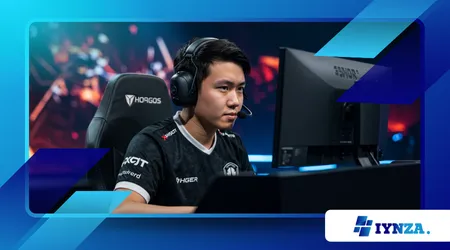Cómo mantenerse mentalmente fuerte en los juegos competitivos

La presión en los videojuegos competitivos es implacable. Los jugadores se ponen a prueba constantemente, no solo en cuanto a sus reflejos y estrategias, sino también en cuanto a su estabilidad emocional y resiliencia mental.
Anuncios
A medida que los deportes electrónicos evolucionan, la demanda de un rendimiento constante en partidos de alto riesgo ha puesto la fortaleza mental en el centro de atención.
En 2025, comprender cómo mantenerse mentalmente fuerte en los juegos competitivos ya no será un lujo: será esencial para la longevidad y el éxito.
Ya seas un aspirante a profesional o un jugador clasificado dedicado, la fortaleza mental influye en cada decisión que tomas.
Desde cómo manejar rachas perdedoras hasta mantener la concentración durante la final de un torneo, la preparación psicológica puede determinar los resultados tanto como la habilidad innata.
A medida que los equipos contratan entrenadores de rendimiento y los jugadores adoptan regímenes de entrenamiento mental, el mundo de los videojuegos está empezando a tratar la concentración, la confianza y la compostura con la misma seriedad que la puntería y la mecánica.
Reconociendo las exigencias mentales del juego competitivo
El juego competitivo exige mucho más que manos rápidas. Detrás de cada flick, jugada decisiva o decisión estratégica hay una mente que trabaja para mantenerse alerta bajo presión.
Los jugadores a menudo se enfrentan a largas horas de práctica, al escrutinio público, a expectativas internas y al impacto emocional de las victorias y las derrotas. Estos elementos pueden debilitar fácilmente el estado mental de un jugador si no se abordan adecuadamente.
Los partidos de alto nivel son mentalmente agotadores. Decisiones instantáneas, leer a los oponentes, adaptarse a mitad del partido y mantener la calma mientras el resultado oscila: todo se acumula.
Reconocer este peso mental es el primer paso. Negar la presión no la hace desaparecer; reconocerla la hace manejable. Los jugadores que aceptan esta realidad pueden empezar a desarrollar hábitos que protejan su estado mental.
Lea también: Juegos en la nube vs. juegos tradicionales: ¿cuál es mejor?
Construyendo una rutina mental previa al juego
La preparación no es solo mecánica, sino psicológica. Los mejores jugadores del mundo tienen rutinas que les ayudan a alcanzar el estado mental adecuado antes de la competición. Estas rutinas no son complicadas.
Pueden incluir ejercicios de respiración, reflexión tranquila, visualización de obras de teatro o simplemente escuchar música que establezca el tono adecuado.
Lo importante es la constancia. Un buen ritual previo al partido crea un punto de control mental que le indica al cerebro que es hora de actuar. Ancla la mente y reduce la ansiedad.
Cuando se practican con el tiempo, estas rutinas se convierten en una fuente confiable de comodidad y control, especialmente durante partidos de alto estrés.
Aprendiendo a reiniciarse después de los errores
En los juegos competitivos, todos cometemos errores. Fallar un tiro, tomar una decisión incorrecta o perder una ronda es algo que les sucede incluso a los mejores.
Lo que distingue a los jugadores mentalmente fuertes es su rapidez de recuperación. Insistir en los errores crea un círculo vicioso de frustración y vacilación, que a menudo conduce a más errores.
La capacidad de reiniciarse tras un revés es una habilidad que se aprende. Empieza por aceptar el fracaso como parte del proceso. Un solo error no define tu juego ni tu valor.
Los jugadores mentalmente fuertes tratan los errores como datos, no como juicios. Analizan, ajustan y siguen adelante. Esto mantiene su atención en el momento presente, donde realmente se produce el rendimiento.
Manejo de la inclinación y los cambios emocionales
La inclinación puede arruinar los juegos. Es el estado donde la frustración nubla el juicio y las emociones toman el control. Una mala muerte se convierte en una agresión imprudente.
Una mala interpretación se convierte en pérdida de confianza. Si no se controla, la inestabilidad se propaga como un virus, infectando a equipos enteros.
La resiliencia mental no significa nunca frustrarse, sino detectar la frustración a tiempo y saber cómo reaccionar. Tomar descansos cortos, restablecer la postura, respirar más despacio o alejarse después de una pérdida son técnicas sencillas pero eficaces.
Los jugadores que toman conciencia de sus desencadenantes y respuestas pueden evitar que la inclinación descarrile su juego.
Desarrollar la resistencia mental para sesiones largas
Los torneos, las partidas clasificatorias y los bloques de práctica suelen durar horas. Mantener la concentración durante largas sesiones requiere resistencia mental. Sin ella, el rendimiento disminuye, no por fatiga mecánica, sino por sobrecarga cognitiva.
Desarrollar la resistencia mental implica práctica estructurada.
Esto significa incorporar sesiones de concentración, descansos programados y tiempo libre para la recuperación mental. Así como no correrías durante tres horas seguidas, no debes esperar que tu mente mantenga su máximo rendimiento sin descanso.
La hidratación, la nutrición y el sueño también juegan un papel fundamental en el apoyo a la función mental durante el juego prolongado.
La confianza se construye con la preparación y el diálogo interno
La confianza no es arrogancia. Es creer en tu capacidad para afrontar cualquier desafío. En los juegos competitivos, esta mentalidad distingue a los jugadores reactivos de los proactivos.
Los jugadores seguros hacen jugadas decisivas. Lideran. Se adaptan. Y cuando fallan, aprenden sin desmoronarse.
Desarrollar la confianza empieza con la preparación. Cuando sabes que has practicado a fondo, confías en tus instintos. Pero también se construye en el momento, a través del diálogo interno.
Lo que te dices a ti mismo después de un error, en un momento decisivo o entre rondas moldea tu mentalidad. Un lenguaje interno positivo ayuda a estabilizar las emociones y a agudizar la toma de decisiones.
Frases como “lo tengo todo bajo control” o “concéntrate en la próxima ronda” pueden parecer pequeñas, pero anclan la mente cuando más importa.
Manejo de la presión y las expectativas
El peso de las expectativas (ya sea de usted mismo, de su equipo, de sus fanáticos o de su entrenador) puede aplastar su mentalidad si no se controla.
La presión es parte de la competición, pero no tiene por qué controlarte. Los jugadores que se mantienen mentalmente fuertes desarrollan herramientas para afrontar estos momentos.
Una de esas herramientas es la perspectiva. Centrarse en los resultados y centrarse en la ejecución ayuda a reducir la presión. No se pueden controlar los resultados, pero sí el esfuerzo, la concentración y la comunicación.
Esta mentalidad convierte la presión en oportunidad. En lugar de pensar: "No puedo perder esto", los jugadores mentalmente fuertes piensan: "Demos lo mejor de nosotros". Ese sutil cambio lo cambia todo.
Practicar la fortaleza mental en los juegos competitivos como cualquier otra habilidad
Al igual que la puntería o el conocimiento de un mapa, la fuerza mental se puede entrenar. Requiere repetición, consciencia y retroalimentación.
Los jugadores que se toman el tiempo para registrar sus emociones después de las sesiones, reflexionar sobre patrones de mentalidad o trabajar con entrenadores de rendimiento mental ven ganancias a largo plazo.
Las prácticas diarias como la meditación, la visualización y los ejercicios cognitivos desarrollan la flexibilidad mental.
Con el tiempo, los jugadores desarrollan una recuperación emocional más rápida, una mayor concentración y un mayor control sobre sus estados internos. El entrenamiento mental no consiste en ignorar las emociones, sino en gestionarlas con intención.
El papel de la cultura de equipo en la salud mental
En los juegos de equipo, la fortaleza mental individual tiene un límite. El entorno en el que juegas importa. Una cultura de equipo constructiva y de apoyo fomenta la resiliencia.
Un enfoque tóxico y basado en la culpa lo destruye. En 2025, muchos equipos están invirtiendo fuertemente en crear entornos que fomenten el bienestar de los jugadores.
Los equipos que priorizan la comunicación, el respeto mutuo y la responsabilidad compartida crean una base donde los jugadores se sienten seguros para crecer.
Los líderes de equipo desempeñan un papel fundamental en modelar un comportamiento saludable: se mantienen al tanto de cómo están sus compañeros, establecen un tono emocional y crean espacios para conversaciones honestas. Este tipo de cultura transforma la presión en unidad y los reveses en remontadas.
Conclusión
Mantenerse mentalmente fuerte en los videojuegos competitivos no es una cualidad, sino un proceso. Se construye con el tiempo, mediante hábitos, rutinas y reflexión. Se trata de conocerse a uno mismo, gestionar las emociones y mantener los pies en la tierra en el caos del juego de alto nivel.
En un mundo donde cada milisegundo importa y la presión es constante, los jugadores más fuertes son aquellos que dominan su mente tanto como su mecánica.
En 2025, el entrenamiento mental ya no es opcional. Es esencial. Y para los jugadores que se comprometen con él, las recompensas no son solo mejores resultados, sino también carreras más largas, relaciones más sanas y una conexión más profunda con los deportes que aman.
Preguntas frecuentes: Mentalmente fuerte en juegos competitivos
1. ¿Por qué es importante la fuerza mental en los juegos competitivos?
Permite a los jugadores mantenerse concentrados, manejar la presión y recuperarse de los errores, lo que impacta directamente en el rendimiento.
2. ¿Cómo puedo recuperarme rápidamente después de un mal partido?
Tómate un breve descanso, analiza sin culparte y concéntrate en el siguiente partido. Considera cada partido como una oportunidad de aprendizaje.
3. ¿Cuál es un ejercicio mental sencillo que puedo utilizar a diario?
Practica la respiración profunda unos minutos antes de jugar. Calma la mente, agudiza la concentración y reduce la ansiedad.
4. ¿Cómo evitan los profesionales la inclinación?
Reconocen los desencadenantes emocionales de forma temprana y utilizan herramientas como pausas, respiración y reenfoque para recuperar el control.
5. ¿Puede el entrenamiento mental realmente mejorar mi juego?
Sí. Los hábitos mentales fuertes mejoran la toma de decisiones, reducen los errores y mantienen un alto rendimiento bajo estrés.
